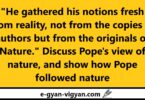
Mystical elements in Wordsworth’s poetry.
Mystical elements in Wordsworth’s poetry.
Mysticism is a temper, a mood rather than a doctrine or a systematic philosophy of life. A mystic has apprehensions of a world of divine reality behind and within the ordinary world of sense perception. He feels that the external universe, which lies open before his eyes and ears, speaks to him through his sense, to his soul. He wants to know who it that speaks to him in this way is. He comes to the conclusion that the external world must be animated by a soul or life of its own. Whence comes this life or soul of nature? Its source must also be same as that of the soul of man. In other words, the mystic feels that the supreme soul of God is one and the same, but it assumes difference forms, it animates Man as well as the different objects of nature. Thus, the mystic believes not only that Nature is alive but also that there is essential identity of being between man, nature and God. He sees, “One undivided, changeless life in all lives, one inseparable in the Separate.” He believes that, “all things in the visible world are but forms and manifestations of the one divine Life, and that these phenomena are changing and temporary while the soul that informs them id eternal.”
A mystic is thoroughly anti-rational and anti-scientific in temper. He distrusts reason and intellect the worth of sense has no meaning for him. He looks beyond it and through it, at the divine which is the only reality for him. He realizes this truth not by reason but by intuition and by his mystic experiences. When the mood is upon him, he and sudden, “flashes, of illumination”, in which he sees into the heart of things and realizes the truth of the Divine animation of Nature. It is all a matter of faith and experience, for it asked the mystic can give no treason for conviction. His vision is intuitive, and he feels that all can have this vision through contemplation and meditation.
A mystic is also convinced that the human soul is eternal. It is the bodry which dies, the soul lives on. As Shelley puts it, death is merely a transformation. The soul comes to this world from the eternal and assumes a particular form-after death it still lives on in the eternal and may assume some different form. This was also the faith of Plato,
Wordsworth’s temper was essentially mystical; Mysticism is such a fundamental and pervading element in this thought that it must be considered very carefully. “He imparts a separate life and soul to Nature, and that is his most important contribution to English poetry. He felt that all nature has life. And that every object of nature enjoys its life.”
“The budding rigs spread out their fan
To catch the breezy air
I must think. Do all I can
That there was pleasure there
The soul of nature is one and inseparable, thought it assumes myriads of rooms. This soul, one and indivisible, “circulates from link to link. knowing no charms in between.” When in the midest of nature, just like a mystic he had visions of.
A presence that disturbs me with the joy
Of elevated thought
The “soul of all the worlds” is a divine emanation and in a mood of mystic adoration. The poet addresses it as-
“Wisdom and spirit of the universe
The soul that is the Eternity of thought,
And gives to forms and images a breath.
Such to the poet’s conviction, but he can give no rational explanation for it. It is through intuitions and contemplation that he has visions of the divine reality. Reason can give no access to this divine world; it is open only to the spiritual faculty in man. Indeed the poet has a through distrust of all intellectual and scientific processes and say that the scientists are unfeeling creatures who “murder to dissect” and who would botanies even on the grave of their own mother.
Communication between the soul of Nature and the soul of man possible, for both are emanations from the same divine source. Says S.A. Brooke in this connection “Between the spirit in Nature and the mind in Men there is a pre-arranged harmony and it is this harmony which enables Nature to communicate its own thoughts to man to effect upon then until a union between them is established.” But this communion can be possible only for those who approach nature in a right mood, in a ” mood of wise passiveness” or in that “blessed mood” in which we are lost in the contemplation of nature till-
“We are laid asleep
In body, and become a living soul.”
This is the meditation of a mystic; this is how a mystic has communion with the divine, Language is and instrument for the expression rational though, and as mystic experiences and visions, by their very nature, are the reverse of the rational, ordinary language cannot communicate them fittingly. The result is much obscurity and vagueness.
To grasp this point of essential kinship between the spiritual faculty in man and the indwelling soul of the universe is to understand Wordsworth’s famous thesis that nature is the best and the trust of all teachers.
One Impulse from a vernal wood May teach
My teach you more of man
Of moral evil and of good
Than all the sages can.
Lord Morley, who failed to understand the poet’s mysticism, characterized athe slim made for nature as downright nonsense and pointed out that she can teach us nothing at all of mortal evil and of good. But the poet never meant the nature never teaches us better than books the things that nature teaches, He simply meant that if we go to Nature in the right mood and throw ourselves open to her being influences; we shall gain through communication with her more moral energy and nor spiritual insight than we can never get from all the philosophies of the schools and through such energy and insight we shall obtain a clearer vision of good evil than mere knowledge will ever afford.
English – Important links
- Hero of ‘Paradise Lost’ | Hero of Milton’s ‘Paradise Lost’ | Who is the hero of ‘Paradise Lost’
- A note on Milton’s Grand style
- Paradise Lost as a classical Epic | How does Milton employ classical epic convention in his Invocation in paradise last Book.
- “The heights were within Pope’s reach, and he reached them.” Justify and criticise
- If Pope be not a poet, where is poetry to be found?” Comment on this judgment of Johnson on Pope
- Pope’s contribution to English poetry | Discuss Pope as a poet of correctness
- “He gathered his notions fresh from reality, not from the copies of authors but from the originals of Nature.” Discuss Pope’s view of nature, and show how Pope followed nature
- Supernatural machinery of ‘The Rape of the Lock’
- Poetic diction of Wordsworth | Confessional elements in words worth’s poetry with reference to the poem prescribed in your course
- Wordsworth as a poet | Different stages of Wordsworth’s love for nature | Chief features of Word worth’s poetry
Disclaimer: e-gyan-vigyan.com is created only for education purpose and education sector. We only provide links and materials already available on the Internet. If in any way it violates the law or there is any problem then please mail us- vigyanegyan@gmail.com







